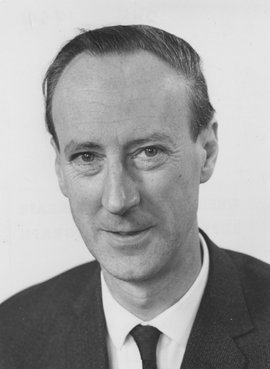John Westcott facts for kids
Quick facts for kids
John Westcott
|
|
|---|---|
 |
|
| Born |
John Hugh Westcott
3 November 1920 |
| Died | 10 October 2014 (aged 93) |
| Nationality | British |
| Awards | Fellow of the Royal Society (1983) |
| Scientific career | |
| Fields | Control Systems |
| Institutions | Imperial College London |
| Thesis | Studies in Analysis of Servomechanisms with the Development of a New Performance Criterion (1951) |
| Doctoral advisor | Colin Cherry |
| Doctoral students |
|
John Hugh Westcott (born November 3, 1920 – died October 10, 2014) was a smart British scientist. He was an expert in something called control systems. He also taught at Imperial College London, a famous university in London.
Contents
Early Life and Education
John Westcott went to school at Wandsworth Grammar School in London. He also studied at the City and Guilds College. Later, he got a scholarship to the MIT in the United States.
Working with Technology
John Westcott started his career during World War II. He worked on radar research. Radar helps detect objects using radio waves. After the war, he went to MIT. There, he joined other scientists who were exploring new ways to use computers.
Pioneering Cybernetics
John Westcott was the first person to teach about a new field called cybernetics in Britain. Cybernetics is about how living things and machines control themselves and communicate. He was part of a group called the Ratio Club. This group met to talk about how the brain works. Famous people like Alan Turing were also in this club.
Leading Control Systems Research
Westcott researched servo-mechanisms at Imperial College London. Servo-mechanisms are systems that use feedback to control movement or position. Think of how a robot arm moves precisely. From 1966, he led the new Department of Computing and Control at Imperial College.
He helped start the International Federation of Automatic Control in 1957. This group helped scientists from different countries work together. He also advised big companies like Shell and ICI. He helped them use control systems in their large factories and processes. In the 1970s and 1980s, he also worked on computer models. These models helped understand and plan for big economic systems.
Awards and Recognition
John Westcott received many honors for his work. In 1980, he became a Fellow of the Royal Academy of Engineering. In 1983, he was elected a Fellow of the Royal Society (FRS). Being a Fellow of the Royal Society is a very high honor for scientists in the UK.
 | William Lucy |
 | Charles Hayes |
 | Cleveland Robinson |

